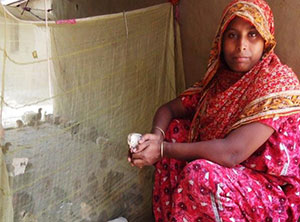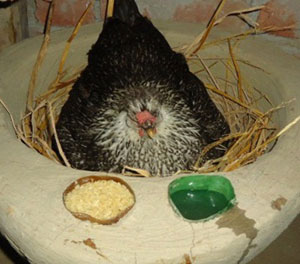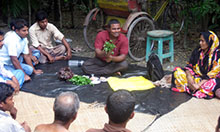
Manjila Khatun lives in Padmapukur village in Abhaynagar upazila of Khulna division with her two youngest sons. Her husband, Ashraful, died two years ago and her eldest son is staying at an orphanage. Manjila is the only earning member in her family, working as a maid, and has faced significant hardships to support her family. She was determined to make a better life for her family.
In November 2013, SPRING called a meeting in her village, and Manjila attended it in the hope of receiving some sort of financial benefit. While there was no monetary support or offer, she returned home with an improved knowledge on nutrition and diet.
“They talked to us about nutrition and the health of children and mothers, and also why babies and pregnant or lactating women often suffer from malnutrition. They told us most nutritious foods are not expensive and poor people like me can also produce nutritious food at our homesteads with simple techniques and minimum production inputs and labor. I was in a dilemma at the beginning since I didn’t have much land or a pond but after completion of all FNS sessions, I become hopeful and confident,” she said.
The facilitator explained to the participants they would learn new skills on homestead gardening, native chicken rearing, and pond fish culture, as well as get some vegetable seeds to start with if they joined the Farmer Nutrition School (FNS).
I never thought local poultry could give me so much if reared through improved practices.
- Manjila Khatun
Inspired by the motivational descriptions given by the facilitator, Manjila decided to attend all of the FNS sessions. During the FNS sessions, she started putting her learning into practice, notably on native poultry rearing practices. “I never thought local poultry could give me so much if reared through improved practices ,” Manjila said. “I learned about early separation of chicks from the mother, the improved brooding nest (“hajol”), providing formulated feed for the chicks, as well as about hygienic poultry sheds, vaccinations, and treatment, if required. I also learned about increasing production of local poultry two- or three- fold by adopting these improved rearing practices.”

Manjila was also attracted to the idea of poultry rearing as a way to increase her household income. She reshaped her poultry shed with more space (three storied), proper ventilation, enough light, and facilities to clean the shed every day. Before participating in the FNS, each of her chickens had two or three production cycles per year. Now, after adopting improved methods, notably the early separation technique, she has doubled the number of egg-laying cycles to five to six per year and thus increased egg production.
Manjila spends a very small amount every month for extra feed and vaccinations. The profit returned exceeds her expectations. These improved methods help her to be able to frequently feed her growing toddler chicken and eggs to help him grow healthy and strong.
Manjila’s full dream is still ‘hatching’. She is now hoping to increase the number of laying hens from three to around 10 to further increase the egg production, which can ensure family consumption of animal source food, notably for the children as well as giving extra income to the family. “The SPRING project has opened my eyes; hopefully my dream will become a reality soon,” said Manjila.
